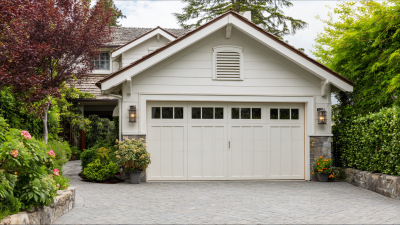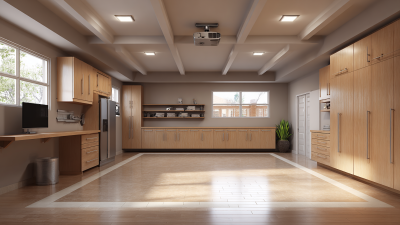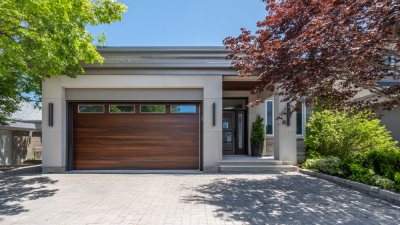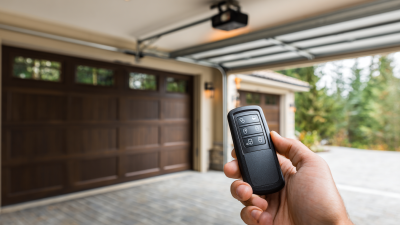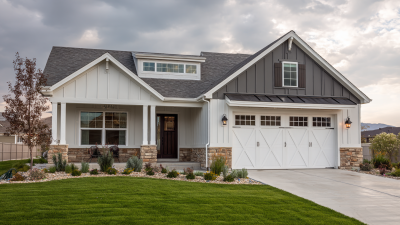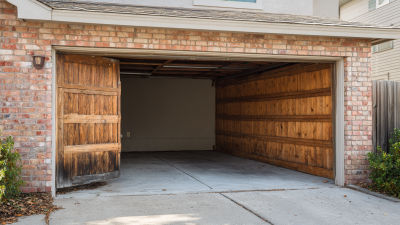When selecting the best garage door for your home, it's essential to consider not just aesthetics, but also functionality, security, and energy efficiency. According to a report from the International Door Association (IDA), garage doors account for approximately 30% of a home's exterior visual appeal and can significantly influence curb appeal and resale value. In fact, a well-chosen garage door can increase a home’s value by up to 4%, making it a paramount investment for homeowners looking to enhance their property.
Furthermore, recent industry analyses indicate that the garage door market is projected to grow at a CAGR of 4.2% between now and 2025, driven by advancements in technology and a growing emphasis on smart home features. As new options emerge—including insulated doors that improve energy efficiency and advanced security systems—homeowners have more choices than ever before. This comprehensive guide will help you navigate the myriad of choices available, ensuring you make an informed decision that aligns with both your aesthetic preferences and practical needs. Whether you prioritize durability, design, or technology, understanding the various types and features of garage doors will be crucial as you embark on this essential home improvement journey.

When choosing the best garage door for your home, understanding your garage space and requirements is crucial. Start by measuring the dimensions of your garage opening to ensure a proper fit. This includes the width, height, and the depth of the setup. Knowing these measurements helps you determine whether you need a single or double door, and what type of door will suit your space best.
Tips: Consider the insulation value of your garage door, especially if your garage is attached to your home. Insulated doors can help maintain a comfortable temperature and reduce energy costs. Also, think about the style that complements your home’s design. Whether it’s traditional, contemporary, or modern, your choice should enhance your curb appeal.
Additionally, evaluate the material of the garage door, as it will impact durability and maintenance. Steel doors are sturdy and low-maintenance, while wooden doors offer aesthetic charm but might require more upkeep. Be mindful of your lifestyle; if you frequently use the garage as a workshop, a door with additional features like windows for natural light can be highly beneficial.

When selecting a garage door, it's essential to consider the various types available, each with its own set of advantages and disadvantages. First, sectional garage doors are popular for their ease of use and thermal efficiency. They consist of panels that move upwards and can be insulated, making them an excellent choice for climates with extreme temperatures. However, they may require more maintenance over time, especially if not properly lubricated.
Another option is the traditional swing-out garage doors, which can add a classic charm to your home. These doors are sturdy and provide a wide entrance for vehicles. However, they require more space to open and close, which can be a significant disadvantage in tighter driveways. Finally, roll-up doors are ideal for those seeking maximum security and space efficiency, as they take up minimal room. Despite their durability, they can be more expensive than other options, and their installation may involve additional considerations due to their design. Each type of garage door has its own unique benefits, so it's crucial to weigh these factors against your specific needs and preferences.
| Type of Garage Door | Pros | Cons | Average Cost |
|---|---|---|---|
| Sectional Garage Door | Flexible, space-saving, good insulation | Can be expensive, maintenance required | $800 - $3,000 |
| Roll-Up Garage Door | Space-efficient, durable, secure | May require professional installation | $1,000 - $2,500 |
| Side-Hinged Garage Door | Classic look, easy access, good for high traffic | Limited opening space, not space-sensitive | $400 - $1,800 |
| Up-and-Over Garage Door | Wide range of styles, affordable | Requires more space to open, can be heavy | $500 - $2,300 |
| Smart Garage Door | Remote access, secure, modern features | Dependence on Wi-Fi, can be pricey | $1,200 - $4,000 |
When selecting the best garage door for your home, evaluating materials is essential to ensure durability, aesthetics, and functionality. Wooden garage doors exude timeless elegance and can be customized in various styles and finishes, making them a popular choice for homeowners seeking classic appeal. However, they require regular maintenance, including staining or sealing, to protect against the elements and prevent warping or rotting over time.
In contrast, steel garage doors are renowned for their strength and security. They offer excellent insulation options, making them energy-efficient while being relatively low maintenance when compared to wood. Steel doors come in various styles and can be finished with protective coatings to prevent rust, although they dent easily. Aluminum, on the other hand, is lightweight and resistant to corrosion, making it an ideal option for coastal areas. While aluminum doors can be slightly less durable than steel, they offer flexibility in design and are available in a range of finishes. Each material has its unique advantages, so considering your home’s climate, style, and maintenance preferences is crucial in making the right choice.
This chart illustrates the popularity and durability ratings of various garage door materials, including Wood, Steel, and Aluminum. The data is based on consumer feedback and expert evaluations.
When selecting the best garage door for your home, it is crucial to consider essential features that contribute to both functionality and security. A report from the International Door Association highlights that around 30% of break-ins occur through garage doors, emphasizing the need for sturdy and secure designs. Look for materials such as steel or fiberglass, which not only provide durability but also enhance security against forced entry. Insulated doors are particularly beneficial as they offer additional protection while improving energy efficiency in your home.
Another vital aspect is the door's locking mechanism. Modern garage doors often feature automatic locking systems that engage when the door is closed. According to a study by the National Crime Prevention Association, homes with secure garage doors can reduce the likelihood of burglaries by up to 50%. Moreover, consider smart technology integration, which allows homeowners to monitor and control their garage doors remotely via smartphone apps. This feature not only boosts convenience but also enhances security, ensuring that the garage is secured at all times.
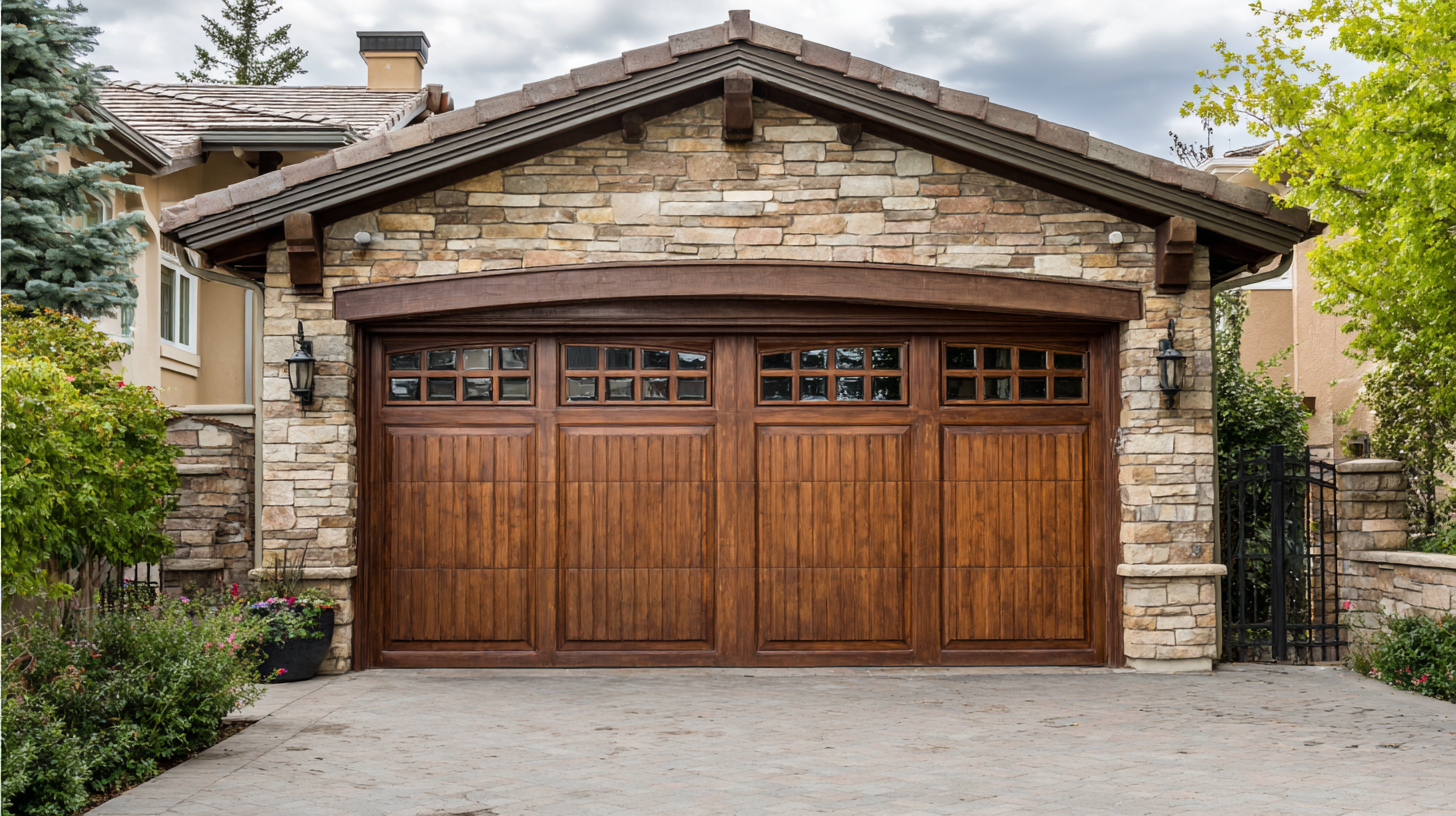
Remember, investing in the right garage door not only adds to the aesthetic appeal of your home but significantly fortifies your security as well.
When selecting the best garage door for your home, understanding cost factors is essential for making a long-term investment. According to the International Door Association, a standard residential garage door can range from $750 to $2,500, with additional costs for installation and accessories. This initial expense must be balanced with longer-term benefits, such as increased home value and energy efficiency. An insulated garage door can save homeowners up to 20% on heating and cooling bills, highlighting the importance of considering energy-efficient models within your budget.
**Tips:** When establishing your budget, factor in materials, insulation, and any potential repairs over time. Steel doors, for instance, may have a higher upfront cost but offer greater durability and less maintenance compared to wood. Additionally, consider installation fees, as professional installation can range from $200 to $600 depending on the complexity of the job. It's always advisable to conduct thorough research on warranties and long-term service agreements, which can further influence your overall costs.
The choice of the right garage door not only affects your immediate financial situation but also your home’s resale value. A well-chosen garage door can yield a return on investment of around 94% as reported by Remodeling Magazine, making it a strategic financial decision. By carefully evaluating both the initial and ongoing costs associated with garage doors, homeowners can ensure they make a wise investment that enhances both function and aesthetics.
